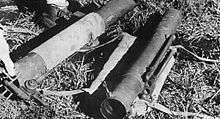Type 4 70 mm AT Rocket Launcher
| Type 4 70 mm AT Rocket Launcher | |
|---|---|
 | |
| Type | rocket launcher |
| Place of origin |
|
| Service history | |
| Used by | Imperial Japanese Army |
| Wars | World War II |
| Production history | |
| Designed | 1944 |
| Number built | 3,500 |
| Variants | None |
| Specifications | |
| Weight | 8 kg /17.64 lb |
| Length | 1.5 m /4.92 ft |
|
| |
| Caliber | 74mm |
| Muzzle velocity | 100 m/s |
The Type 4 70 mm AT Rocket Launcher was a Japanese rocket launcher used during the last year of World War II. It was to be used in the Japanese mainland in case of an invasion by the Allies.
It is comparable to the German Panzerschreck and the American Bazooka.
History
By 1944 the Americans were using M1 Bazooka anti tank rocket launchers in the Pacific Theater against the Japanese. In response, the Japanese began development of the Type 4 Rocket Launcher. Unlike the US rocket that used fins to stabilize it in flight, the Japanese rocket had angled venturis in the base to spin the rocket for stability, similar to the 20 cm (8”) HE rocket.
Development

The launcher was made in two parts that were joined in the middle, similar to the US 3.5” Rocket Launcher. It was designed to be fired by a soldier while prone. The weapon itself had a bipod similar to the one on the Type 99 LMG (Light Machine Gun). The gunner lay with his body at approximately a 45 degree angle to the bore on the left side while the loader was similarly positioned on the other side. The pistol grip and trigger mechanism were attached to the rear half of the launcher. A cable ran from the trigger to the rear of the launcher where the hammer was located. The hammer and firing pin was mounted on an arm. The arm was above the bore and out of the way of loading the rocket when it was in the cocked position. Pulling the trigger pulled the pin holding the arm in position and the arm swung around under spring pressure, striking the primer and igniting the rocket.
The 70mm rocket, like the 20 cm model, used a mortar fuze. There would be no set back when the rocket was fired to arm an artillery fuze. The Japanese mortar fuse for the 81mm and 90mm used a shear wire to make it bore safe. The wire went through the brass body and aluminum firing pin plunger. Upon impact the plunger was forced back, shearing the wire and freeing the plunger to strike the firing pin and detonate the round.